Thanks for your support! If you make a purchase using our links in this article, we may make a commission. And, as an Amazon Associate, I earn from qualifying purchases. See the full disclosure here.
Updated April 5, 2024
When purchasing a camper, don’t worry; you don’t necessarily need a big, expensive truck to pull your smaller rig. We found plenty of campers that you can tow with your SUV. Some have plenty of amenities for your home away from home.
You will find travel trailers on our list that sleep a whole family, have spacious bathrooms, and others that will take you on backroad adventures.
Check out our list of the 10 best campers to tow with an SUV in major weight categories. We will include examples of SUVs that fit each category to give you some perspective. But don’t consider this an all-inclusive list for SUVs or campers.
- How Much Can My SUV Tow?
- 10 Best Campers to Tow With an SUV
- 1. Airstream Basecamp
- 2. Rockwood Geo Pro G19BH
- 3. Bigfoot 2500 B21
- 4. Forest River Remote 19R
- 5. Droplet XL
- 6. East To West Silver Lake 16RBLE
- 7. Cruiser RV Hitch 18MRB
- 8. Heartland Sundance 211MB
- 9. Winnebago Minnie 1808FBS
- 10. TC Teardrops Adventure
- What Weight Do I Look at for Towing a Camper?
- Unloaded Vehicle Weight (UVW)
- Cargo Carrying Capacity (CCC)
- Gross Vehicle Weight Rating (GVWR)
- Tongue (or Hitch) Weight
- Final Words About Travel Trailers To Tow With SUVs
- Related Reading:
How Much Can My SUV Tow?
The best way to learn how much your SUV can tow is to check your owner’s manual. Smaller SUVs come with one or two towing capacities, but larger versions can have multiple versions.
Towing capacity comes from your engine’s horsepower and torque, transmission gearing, and other components under the hood. Yet the heart of your SUV is only part of the equation.
The skeleton, tendons, and feet of your crossover or SUV have a lot to do with your towing capacity. The chassis, suspension, axles, and even tires affect how much your SUV can tow. You’ll also need the correct weight distribution hitch with sway control.
In our list of the best campers to tow with an SUV, we’ve broken them into the 5 crossover/SUV categories. Each classification has been paired up with travel trailers with a Gross Vehicle Weight Rating that meets the SUV classes’ general towing capacity.
- Mini Crossover SUV: 1,500 lbs.
- Compact Crossover SUV: 2,000 lbs.
- Crossover SUV: 3,500 lbs.
- Mid-Size SUV: 5,000 lbs.
- Full-size SUV: up to 9,300 lbs.
10 Best Campers to Tow With an SUV
With all the benefits of campers towing with an SUV, it’s hard to go wrong. However, some rigs just stand out from the rest, no matter how you look at them. Here are some of the best of the best, with an eye for innovation in size versus living space.
1. Airstream Basecamp
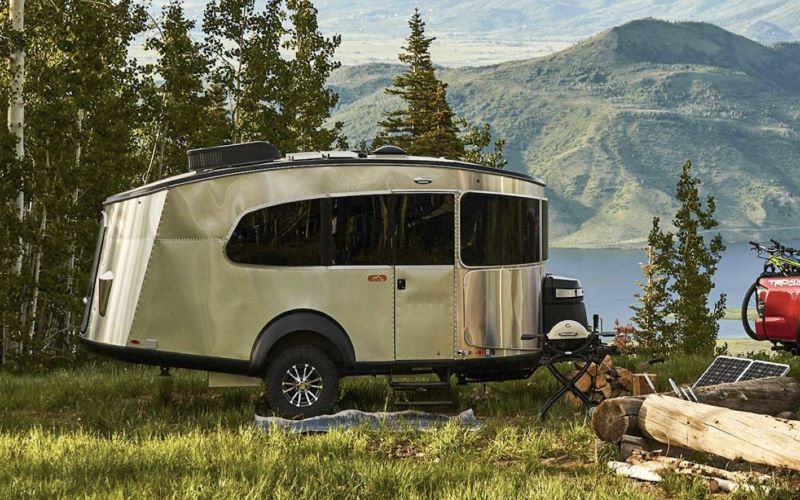
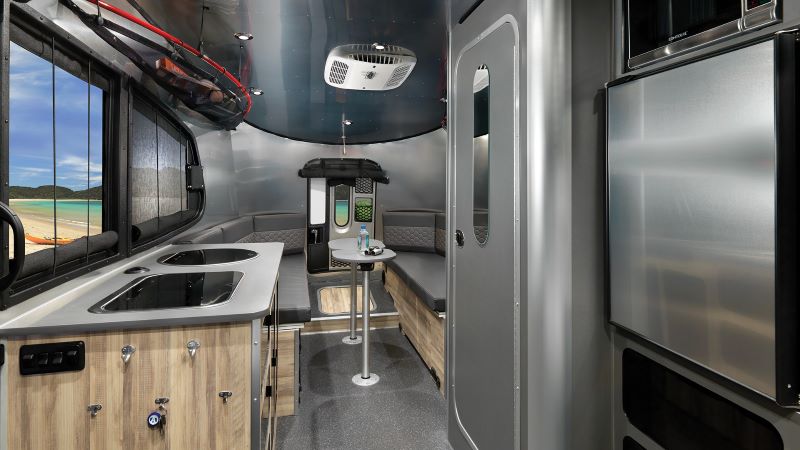
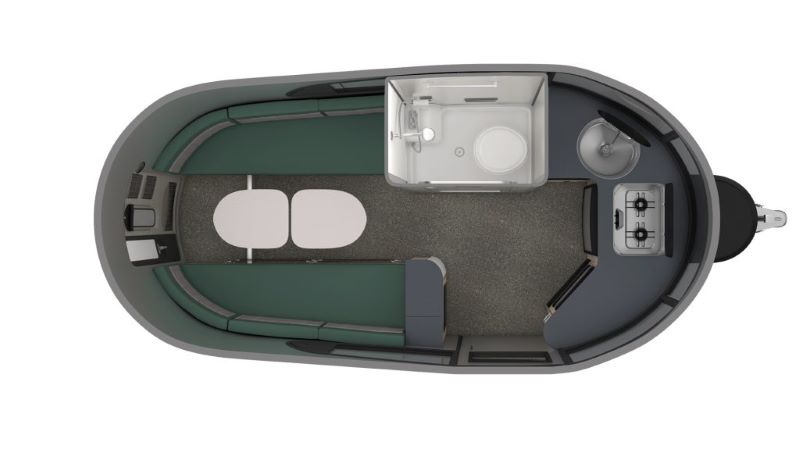
Our Pros and Cons
✅ Incredible interior aesthetic of shining, metal walls with panoramic windows
⛔ Definitely a little pricier than comparable brands and models
- Length: 16′ 3″
- UVW: 2,700 lbs
- GVWR: 3,500 lbs
- CCC: 800 lbs
- Tongue Weight: 450 lbs
- Sleeps: 2
The Airstream Basecamp comes in two floorplans with different options for each. The above specs match Basecamp 16. There’s also the 20, which features an 800-lb increase in GVWR and UVW. Though there are SUVs that will haul the Basecamp 20, be very sure that yours can handle the higher weight before you jump on it.
If you love the boondocking life, it’s a good idea to opt for the Special Edition version, which features LP batteries, more storage, and enough room to sleep a third individual. The standard Basecamp features 200 watts of rooftop solar, while the Special Edition ups the ante with 360 watts!
2. Rockwood Geo Pro G19BH
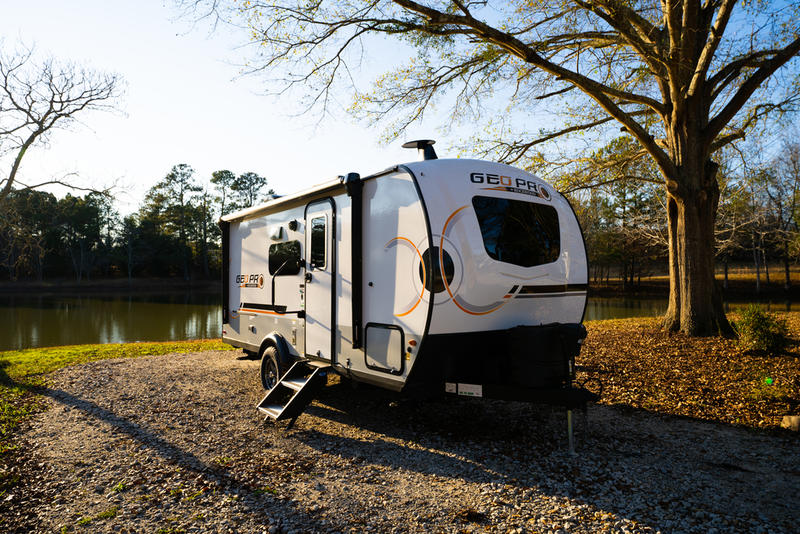
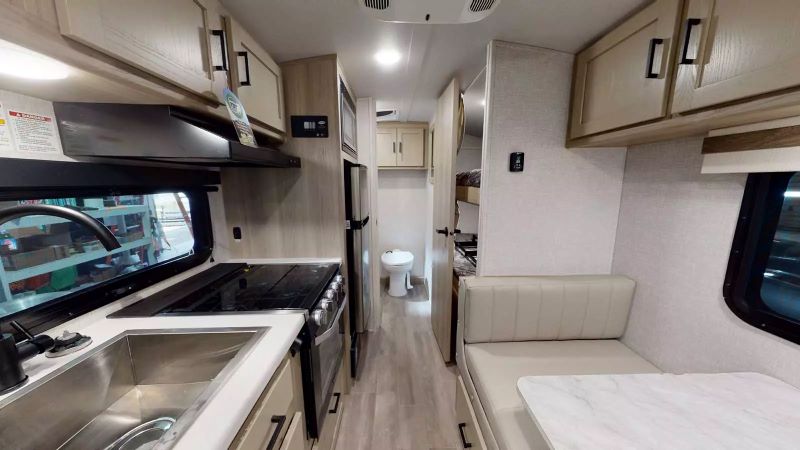
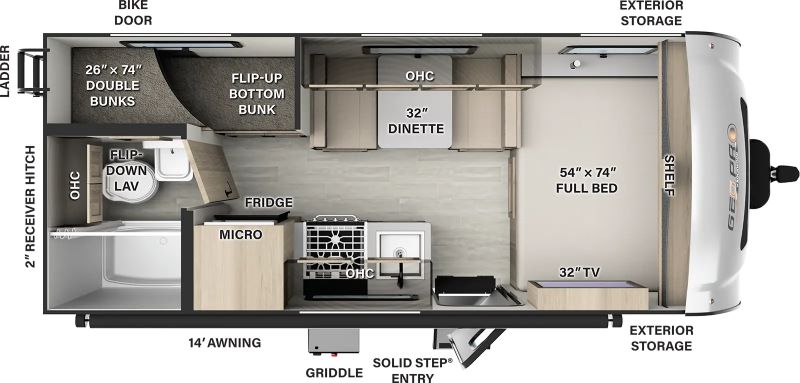
Our Pros and Cons
✅ Solid storage space with over half a ton of cargo-carrying capacity
⛔ Bathroom is a little tight by necessity
- Length: 20.2′
- UVW: 3,209 lbs
- GVWR: 4,425 lbs
- CCC: 1,216 lbs
- Tongue Weight: 425 lbs
- Sleeps: 5
One way to do more with less space is to throw in bunk beds. The Geo Pro G19BH does just that, with plenty of room to spare and a weight light enough for SUVs to handle.
You get the whole 9 yards with this one, including a tight but usable bathroom, a kitchen dinette, a full bed in the front, a sizeable shower, stove, microwave, and fridge.
It also has that authentic, interior aesthetic, something that really small campers sometimes lack. If you’re not using the bunks, the bottom one flips up for an additional storage option, so the bunks don’t just sit there, taking up space when you’re traveling as a couple or solo. The G19BH is a fine example of more with less.
3. Bigfoot 2500 B21
Our Pros and Cons
✅ Fantastic fiberglass body with a design for handling just about anything nature can throw at it
⛔ Corner beds are always a little problematic when it comes to couples getting in and out
- Length: 21′ 6″
- UVW: 4,308 lbs
- GVWR: 7,500 lbs
- CCC: 3,192 lbs
- Tongue Weight: 440 lbs
- Sleeps: 3
Bigfoot RV has a reputation for campers that are built like tanks. While featuring a structure and construction model similar to the Olivers, Scamps, and Escape campers of the world, Bigfoot sports a more traditional exterior design. It looks like a fantastic, everyday camper, but it can withstand an avalanche.
It’s also a trooper when it comes to CCC, with a ton and a half of capacity. With a design that features the dinette all the way in the front, there’s enough room for everything else to stretch out. The counter space is surprisingly long, with a sizeable rear bathroom and a corner bed.
4. Forest River Remote 19R
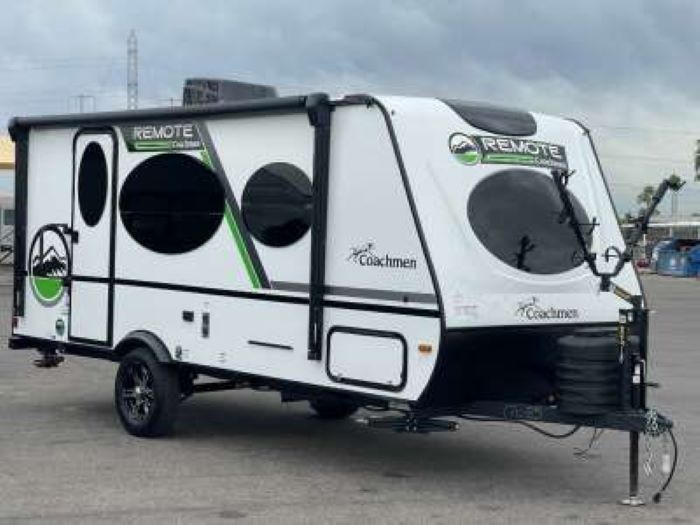
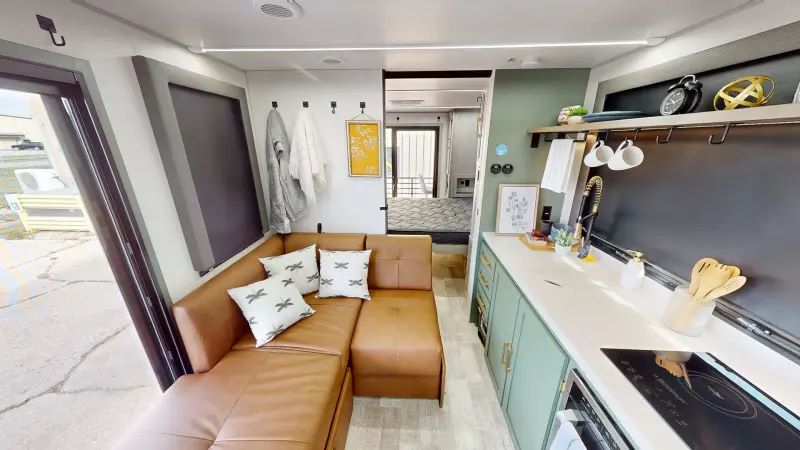
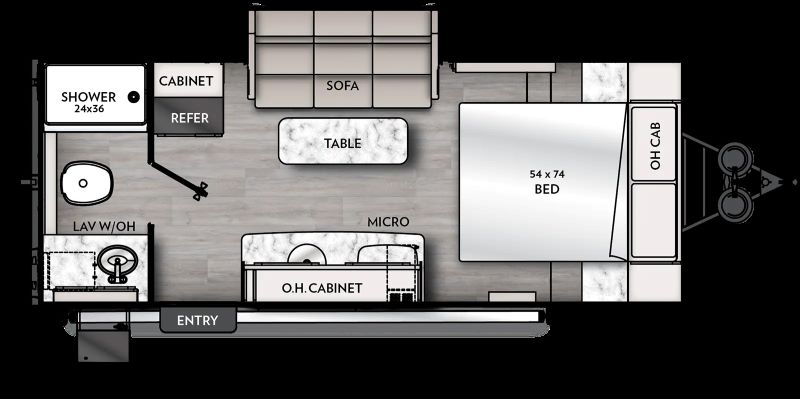
Our Pros and Cons
✅ Rear bathroom location allows for a lot of extra space
⛔ Bathroom door opens to the front of the fridge
- Length: 21′ 8″
- UVW: 3,556 lbs
- GVWR: 4,700 lbs
- CCC: 1,144 lbs
- Tongue Weight: 378 lbs
- Sleeps: 4
The Forest River Remote 19R is the perfect example for campers to tow with an SUV. It’s great for couples or even a small family with a maximum of four sleepers. Instead of a traditional dinette, it features a long sofa in front of a table, which brings back echoes of residential living and eating while catching the latest movie or streaming episode.
There’s plenty of cabinet space throughout, and the large bathroom is exceptional for an RV of this size. In fact, it makes you wonder why all small travel trailers don’t feature a rear bathroom that takes up the width of the trailer. Not only does it present a larger bathroom, but it also cuts down on the amount of space the bathroom takes up.
5. Droplet XL
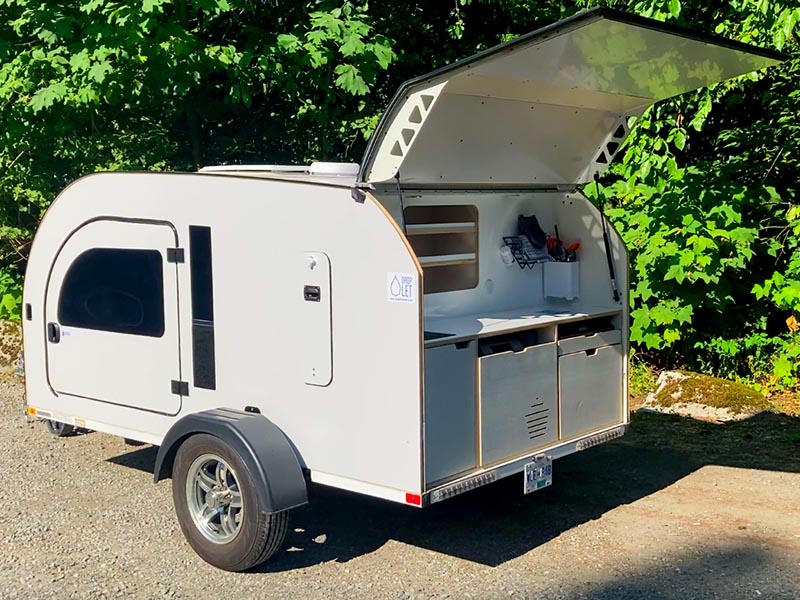
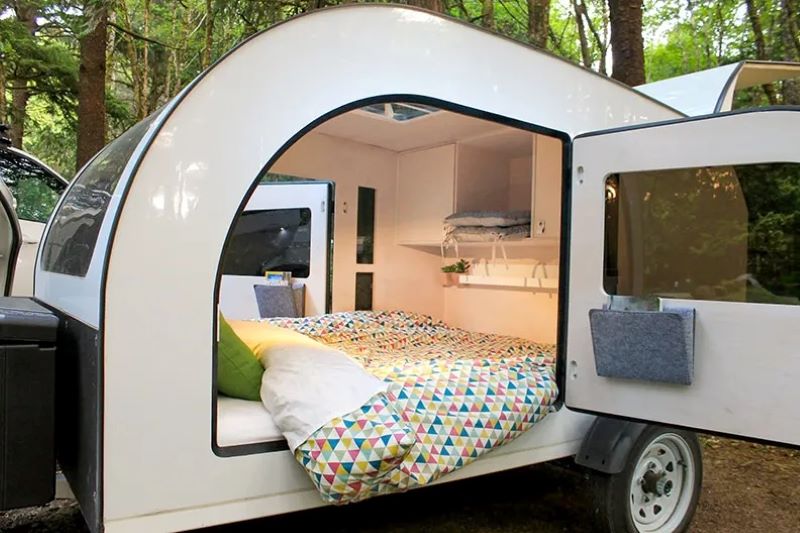
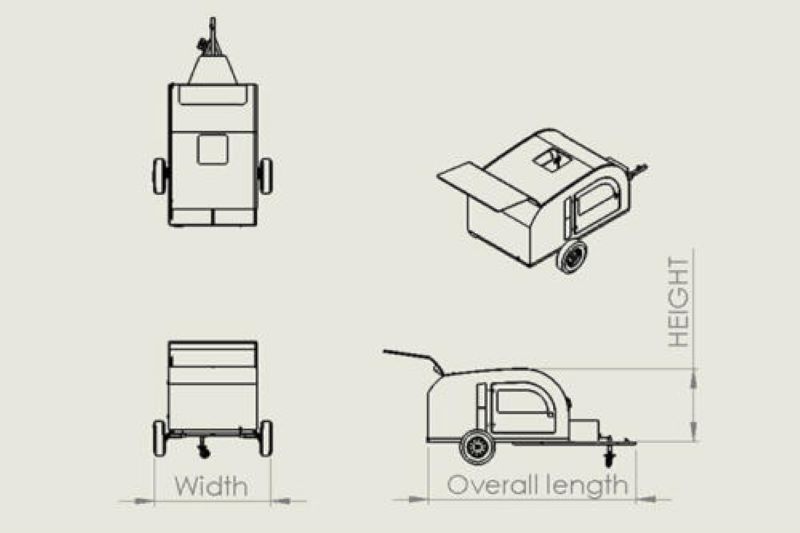
Our Pros and Cons
✅ Huge windows that open the entire interior up and make sleeping at night an adventure
⛔ Traditional limitations of a teardrop
- Length: 9′ 6″
- UVW: 1,050 lbs
- GVWR: N/A
- CCC: N/A
- Tongue Weight: 150 lbs
- Sleeps: 2
As an article about campers to tow with an SUV, we would be remiss if we left out the teardrops category. The Droplet XL is a fun little pocket of living innovation on wheels. Like most teardrops, the kitchen is on the outside, beneath the back hatch, with cabinetry, drawers, shelves, and racks to boot.
As the XL version, the Droplet offers more sleeping space and more storage options than the standard edition. The windows are large and extensive, enough so that you feel like you’re sleeping under the stars at night. It also features off-road tires for hitting the backroads and spending some camping time off the grid.
6. East To West Silver Lake 16RBLE
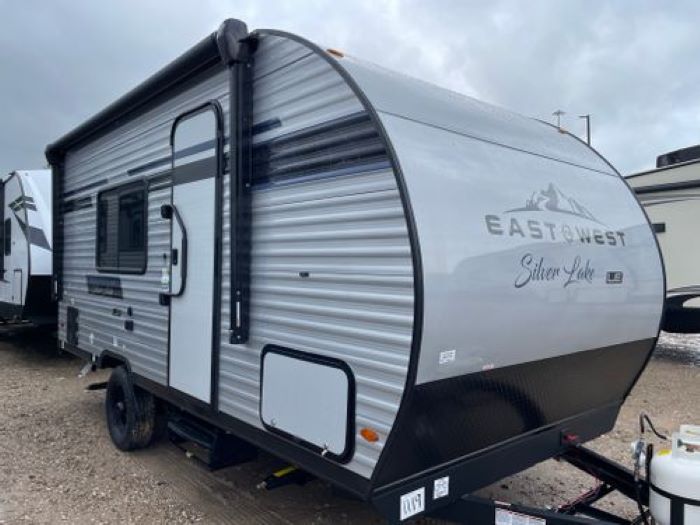
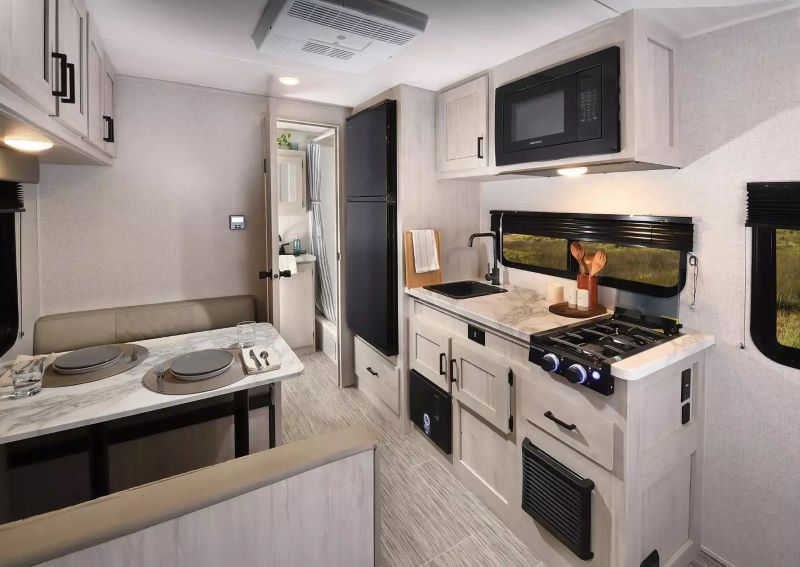
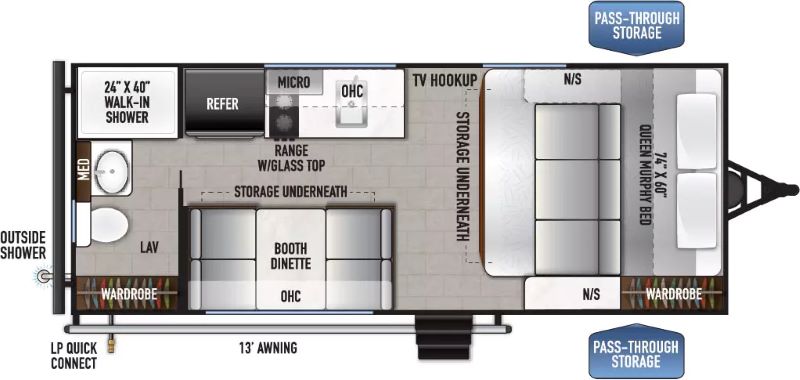
Our Pros and Cons
✅ Booth Dinette includes overhead cabinetry and underneath storage
⛔ You’ll need an extra, hinged mount if you install a TV
- Length: 21′ 3″
- UVW: 3,584 lbs
- GVWR: 4,955 lbs
- CCC: 1,371 lbs
- Tongue Weight: 555 lbs
- Sleeps: 4
The rear bathroom that runs the width of the travel trailer never gets old. It makes for a lot of extra bathroom space, while not eating into the overall space of the camper. The East-to-West Silver Lake 16RBLE also has a surprisingly robust number of storage options.
There are storage spaces under the dinette, under the bed, pass-thru storage, a wardrobe in the bathroom, plenty of cabinetry, and overhead cabinets above the dinette. With over half a ton of CCC, you won’t find yourself wanting for space or weight limitations when storing your gear.
7. Cruiser RV Hitch 18MRB
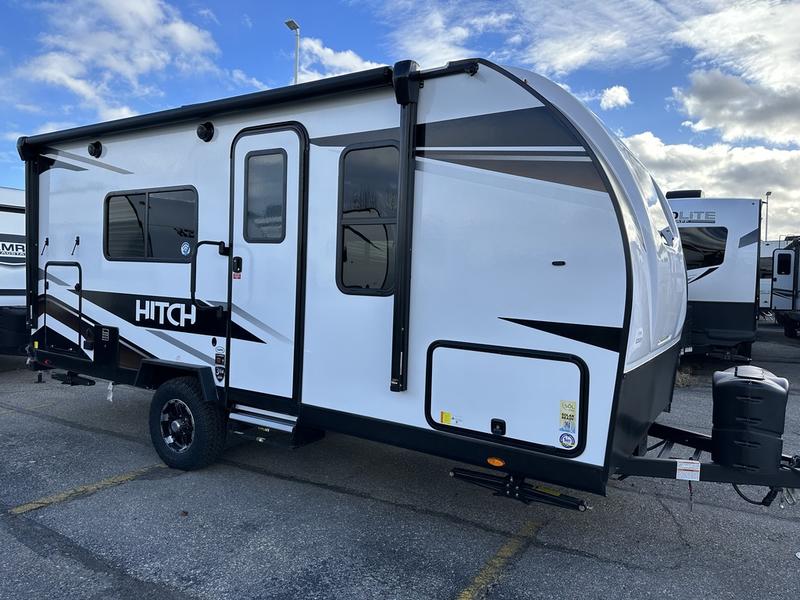
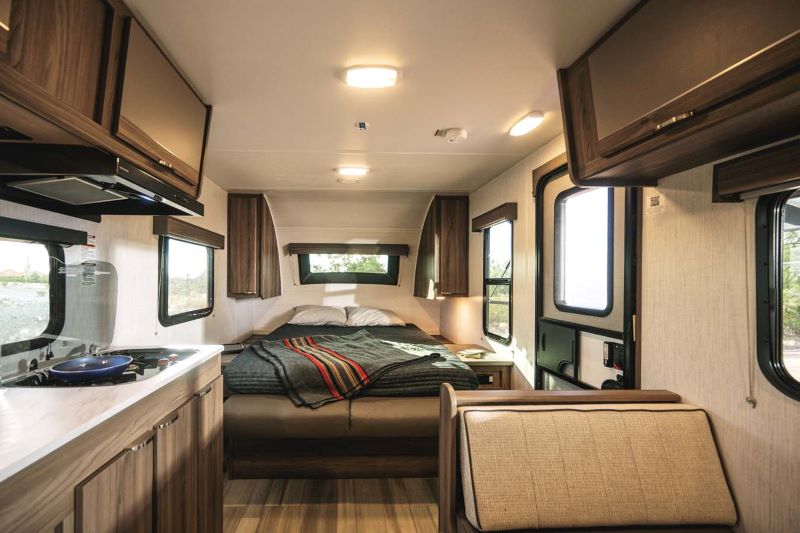
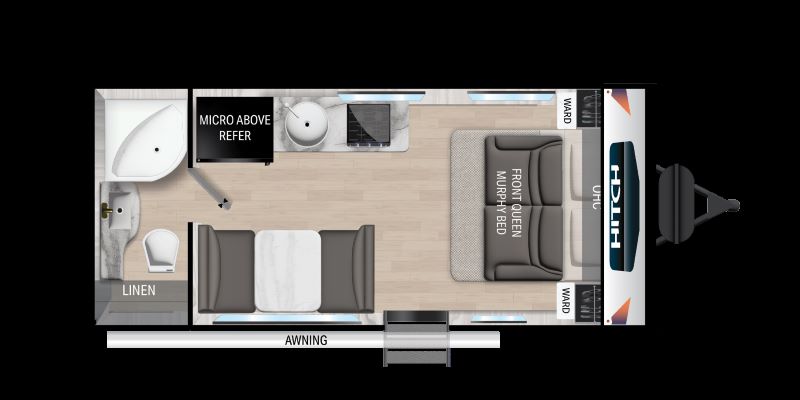
Our Pros and Cons
✅ Large bathroom with a tub/shower and a linen closet
⛔ No traditional or convection oven
- Length: 21.9′
- UVW: 3,770 lbs
- GVWR: 4,995 lbs
- CCC: 1,222 lbs
- Tongue Weight: 288 lbs
- Sleeps: 4
Not only do you get the bathroom in the back (as if that observation hasn’t been hammered enough), but you also get the Murphy Bed in the front. Of all the campers to tow with an SUV, this one offers the most customizable space, thanks to these two simple features.
The only thing this camper lacks is an oven. Instead, you get a microwave above the refrigerator, along with a three-burner stovetop. The traditional dinette and compact kitchen counter space round out the rest of this camper. If you like a modular-like space saver, put the Cruiser RV Hitch 18MRB at the top of your list.
8. Heartland Sundance 211MB
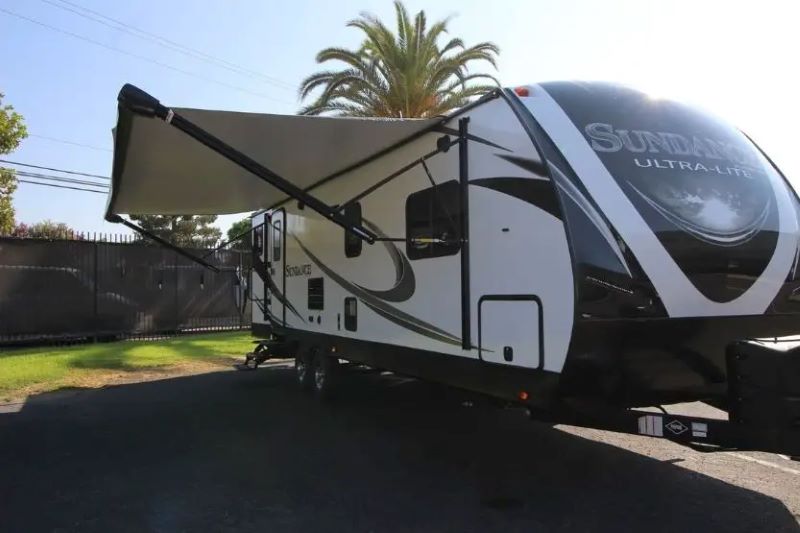
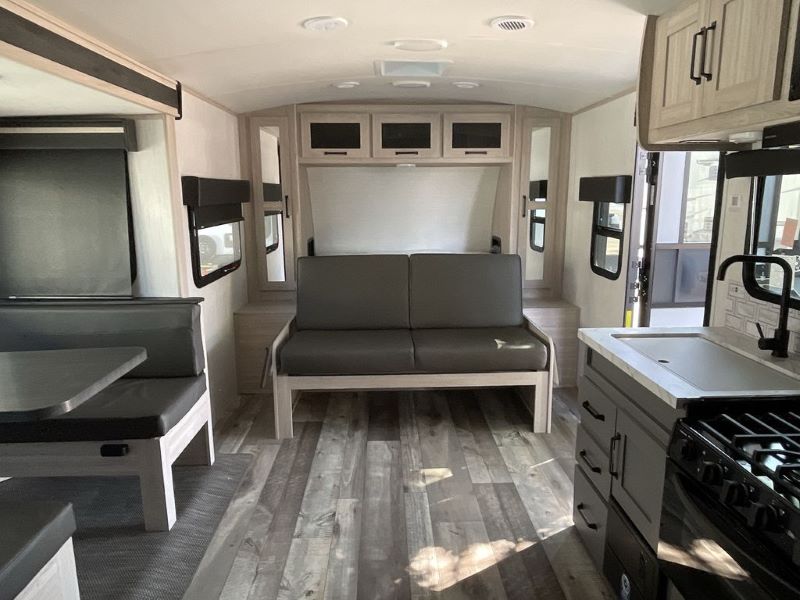
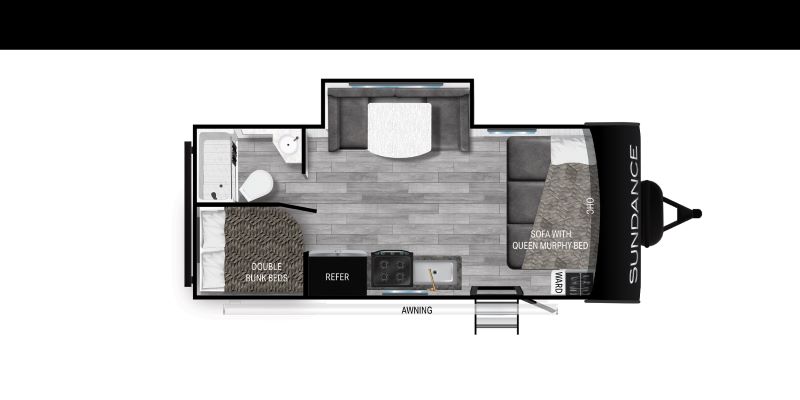
Our Pros and Cons
✅ Murphy bed and double bunks provide plenty of sleeping room with maximum central space
⛔ Relatively basic, entry-level aesthetic and amenities
- Length: 25′ 10″
- UVW: 5,194 lbs
- GVWR: 7,450 lbs
- CCC: 2,224 lbs
- Tongue Weight: 450 lbs
- Sleeps: 8
The Heartland Sundance 211MB is another example on our list of campers to tow with an SUV, that utilizes the Murphy bed and rear bathroom to maximize interior space while providing plenty of living space in between. In this case, however, the bathroom splits the space with double bunks.
This makes the bathroom a little smaller, but still more than enough to hold a sizeable shower, sink, and toilet. The central living and galley spaces are pretty traditional, though this is an excellent entry-level camper with all of the expected amenities in place.
9. Winnebago Minnie 1808FBS
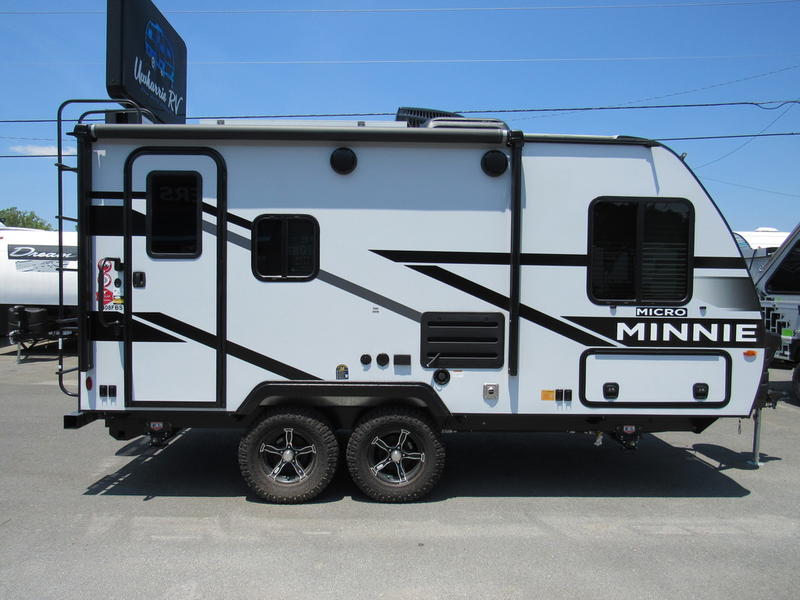
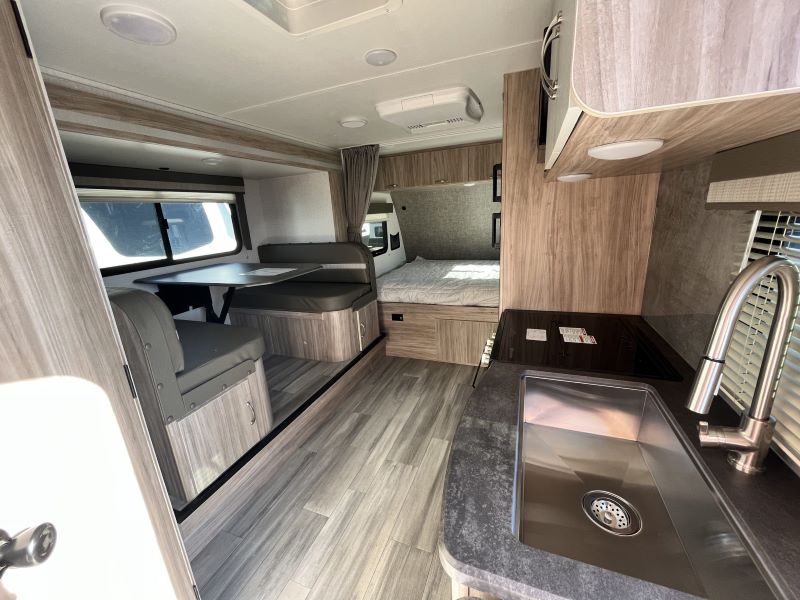
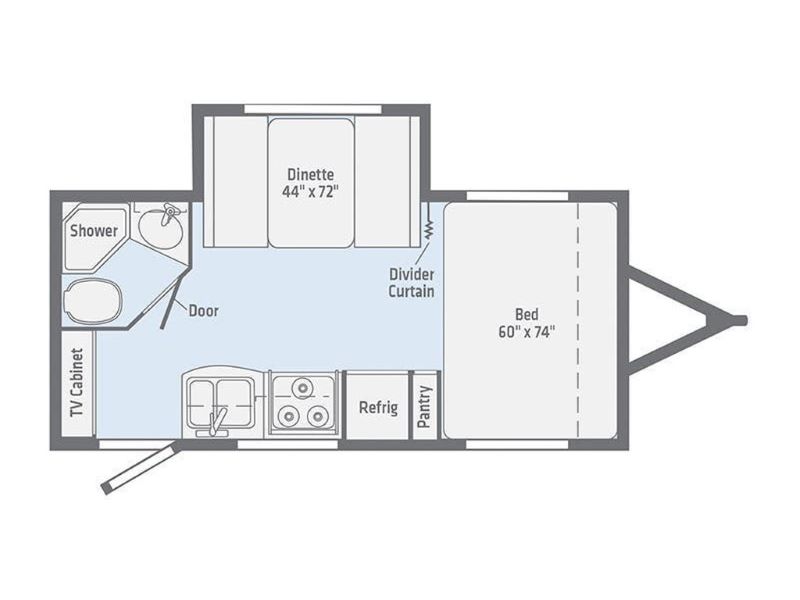
Our Pros and Cons
✅ Excellent weight distribution with dual axles on a tiny camper
⛔ The tiny exhaust fan
- Length: 20′
- UVW: 3,760 lbs
- GVWR: 5,000 lbs
- CCC: 1,240 lbs
- Tongue Weight: 390 lbs
- Sleeps: 4
Ironically, the Winnebago Minnie has a large and growing following. As one of the 10 campers that are good to tow with an SUV, the Minnie is one of the most innovative. For one, it features two axles, a strange feature considering its size, until you realize how much it improves weight distribution.
Winnebago also improved Minnie’s boondocking capabilities by throwing in 190 watts of solar, off-road tires (Goodyear Wranglers), and an improved suspension system. You’ll also love the storage space on the Minnie, with over half a ton of accommodating carrying capacity for all your outdoor needs.
10. TC Teardrops Adventure
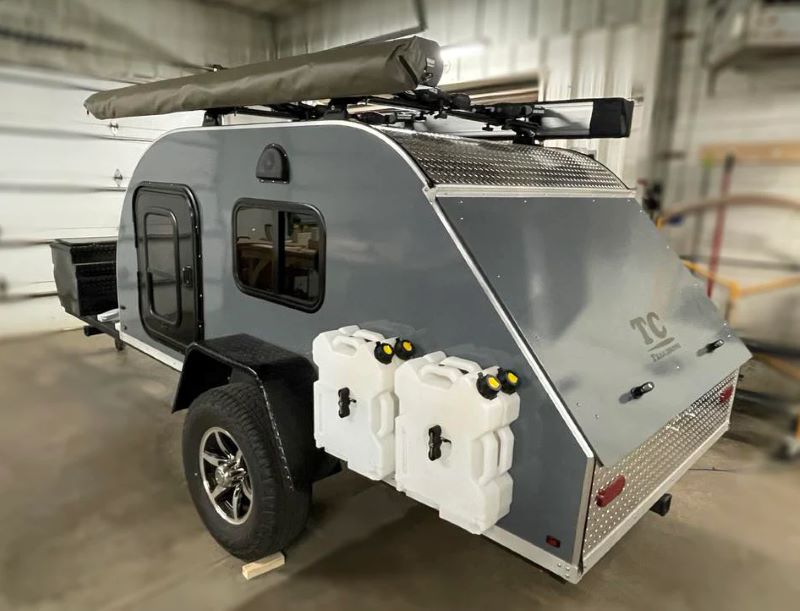
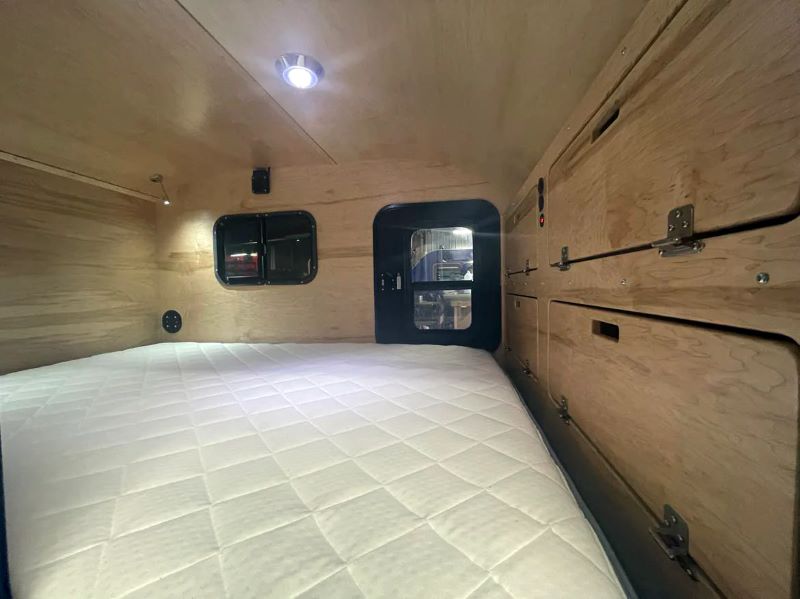
Our Pros and Cons
✅ Enough interior storage options to outfit two people for a week
⛔ Only 10 gallons of freshwater storage
- Length: 10′
- UVW: 1,300 lbs
- GVWR: 3,500 lbs
- CCC: 2,200 lbs
- Tongue Weight: N/A
- Sleeps: 2
The last of our campers to tow with an SUV is the second teardrop on the list. The TC Teardrops Adventure is exactly what it sounds like—a travel trailer for taking on an off-road, backwoods adventure. It is clearly built for it, with up to 35″ off-road tires, a Lock-n-Roll articulating hitch, and a 3,500-lb “de-rated” torsion axle.
The number of add-ons is enticing as well. If you want, you can even add bunk beds to the TC, along with an extended steel frame that’s perfect for throwing on a couple of mountain bikes. The galley is fairly large, with a 25″ depth and all of the amenities you expect in a teardrop, exterior kitchen.
What Weight Do I Look at for Towing a Camper?
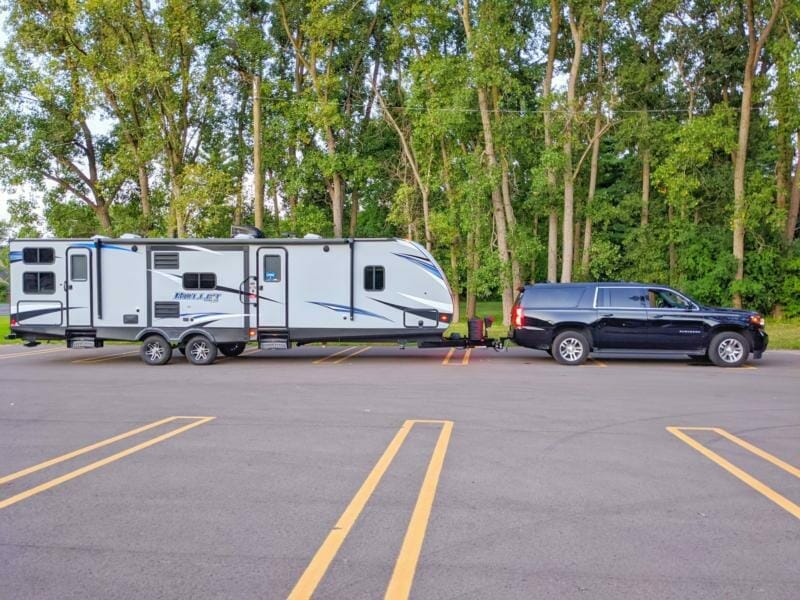
You need to look at several weights when matching up your tow vehicle with a camper.
First, you will need to know how much your SUV can tow. If your vehicle has a maximum trailer weight rating of 8,000 pounds, your trailer needs to have a gross vehicle weight rating (GVWR) of less than 7,000 pounds.
For example, the trailer you want to purchase has a dry weight of 6,500 pounds and a cargo capacity of 1,000 pounds. Add those two numbers together to get the GVWR. In this case, that would be 7,500 pounds, below your maximum tow capacity.
Dry Weight + Cargo Carrying Capacity = Gross Vehicle Weight Rating
RV manufacturers may publish gross vehicle weights that are slightly different. Always use their weight rating. If you can’t find it, use the equation above to get a general idea.
There will always be some weight added to your trailer, including the holding tanks, so you will need to make sure that your trailer’s dry weight and the cargo do not add up to more than your SUV’s towing capacity. A great way to find that total in a “real” sense is to head to a CAT Scale and weigh your setup fully loaded.
Here are the common terms you will want to find:
Unloaded Vehicle Weight (UVW)
Or “dry weight.” This is the weight of an empty travel trailer. When we say “empty,” it refers to how the RV came off the factory floor.
Cargo Carrying Capacity (CCC)
The CCC, or cargo-carrying capacity is the maximum additional weight your trailer can handle. Some RV companies use Net Cargo Capacity, which is the same thing.
Gross Vehicle Weight Rating (GVWR)
This is the safest maximum weight to tow your travel trailer or drive your motorhome. This weight comes from the manufacturer and is required by the law and RV regulators. Towing above this rating can void your RV insurance if you get into an accident.
So if the trailer you’re looking at has a UVW, or dry weight, of 6,000 lbs., and a CCC of 600 lbs., the GVWR is 6,600 lbs. If your vehicle can tow 7,000 lbs., then you should be in good shape.
Tongue (or Hitch) Weight
The tongue is the front part of the trailer that hooks to your vehicle’s rear chassis. Tongue and hitch are used interchangeably, but the word “tongue” usually refers to travel trailers, and “hitch” designates fifth wheels.
Your SUV will have a maximum tongue weight rating. Hitch receivers attached to the rear chassis are ideal for towing. Using a ball hitch on your bumper could rip it off with the lightest weights.
The tongue weight rating of a travel trailer is approximately 10%–15% of the trailer’s dry weight.
If you have a travel trailer with a dry weight trailer weight rating of 5,000 lbs., the tongue weight rating should be between 500 and 750 lbs.
As long as your SUV has a tongue weight rating over this range, you won’t damage the rear suspension or drag the bottom of your vehicle on the road as you tow the trailer.
Final Words About Travel Trailers To Tow With SUVs
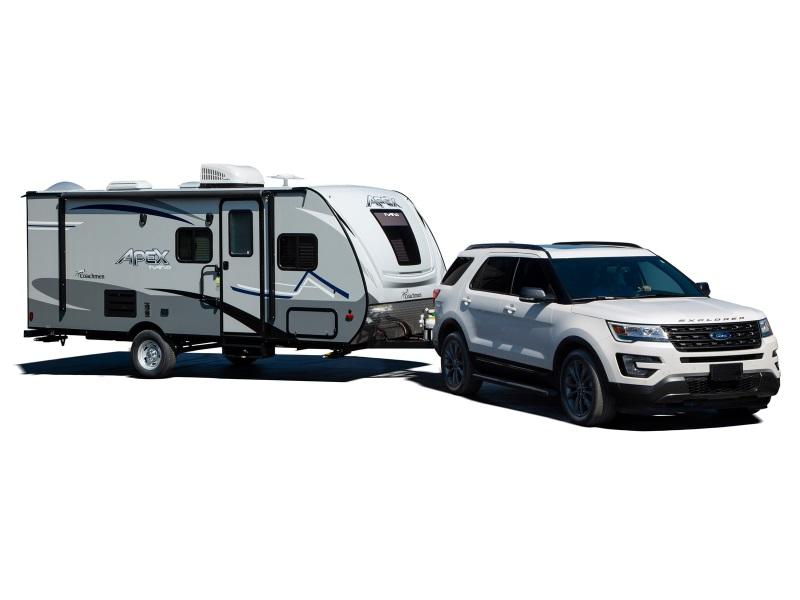
The best person to know what you need in a camper is you. Not everyone can purchase a large SUV, so it’s great to have some choices on the smaller end of the spectrum, both in a camper and tow vehicle.
Make a list of the amenities and options that you desire in a camper, and then take some time to research brands and models. There are so many to choose from that will accommodate a solo traveler, a couple, or a family.
Be sure to check out plenty of reviews for each camper you consider. Even if you don’t plan to buy a new camper, go to an RV show or take a stroll around a local dealer and ask many questions.
Know what your vehicle can tow and consider all the weight factors listed above. You do not want to find the perfect model and then realize it is too big to tow with your SUV.
Finally, enjoy the process. Purchasing a camper is a big decision, and you want to make sure you like what you get. Once you find your ideal SUV and RV pairing, they will take you on adventures for years to come.
Related Reading:
– 5 Best Used Travel Trailers For Couples
– 10 Best Travel Trailers Under 30 Feet for 2024
– 7 Best Used Travel Trailers Under 4000 lbs
– 10 Best Travel Trailers Under 4,000 Lbs for 2024
About the Author
Terri Nighswonger – Author and Full Time RVer
Terri Nighswonger and her husband Todd have been RVing and work camping for six years with their Cavalier King Charles Spaniel, Newton, and their Minnie Australian Shepherd, Remi.
In Addition to the RVBlogger team, Terri has written for RV Life and RV Camping Magazine and is always excited to talk about her passion for RVing and her knowledge and experience in work camping.
Writing is Terri’s passion, but she also loves hiking, kayaking, walking her dogs, and anything she can do outdoors.
They originate from the Midwest but plan to enjoy the West for a few years, wintering in Arizona and summering wherever the road may lead.


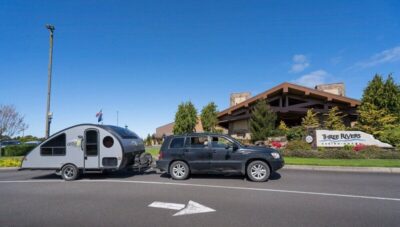
The picture at the beginning of the article shows an Alto R1713, but you never mention it in the article. I have one, at it easily meets my needs on long 2-3 month trips with my wife and greyhound dog. It tows easily behind my Ford Expedition and has been all over southern Canada and most US states. It sleeps 3, has a refrigerator, bathroom, stove and sink inside. I am disappointed that you did not discuss it after putting it on the lead-in.